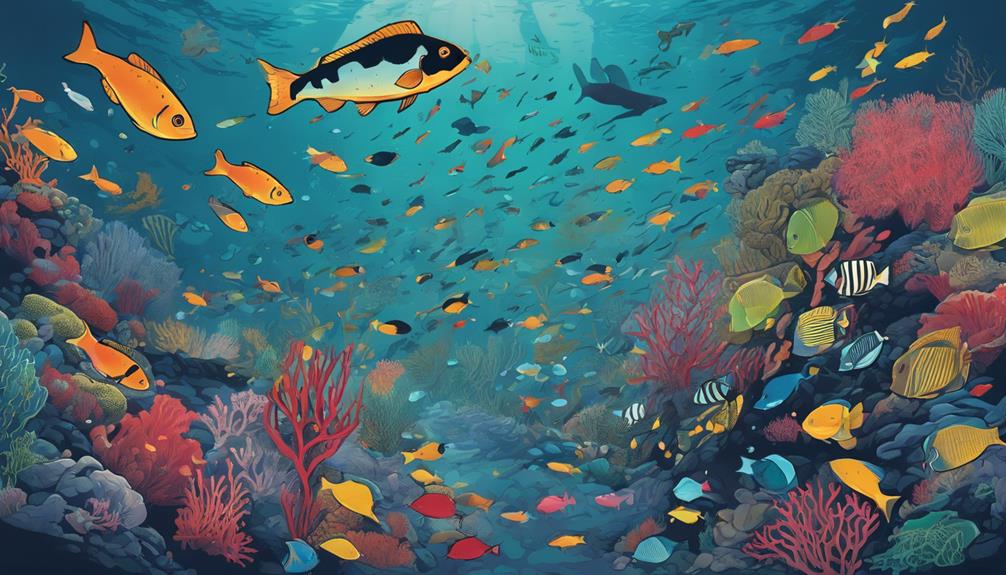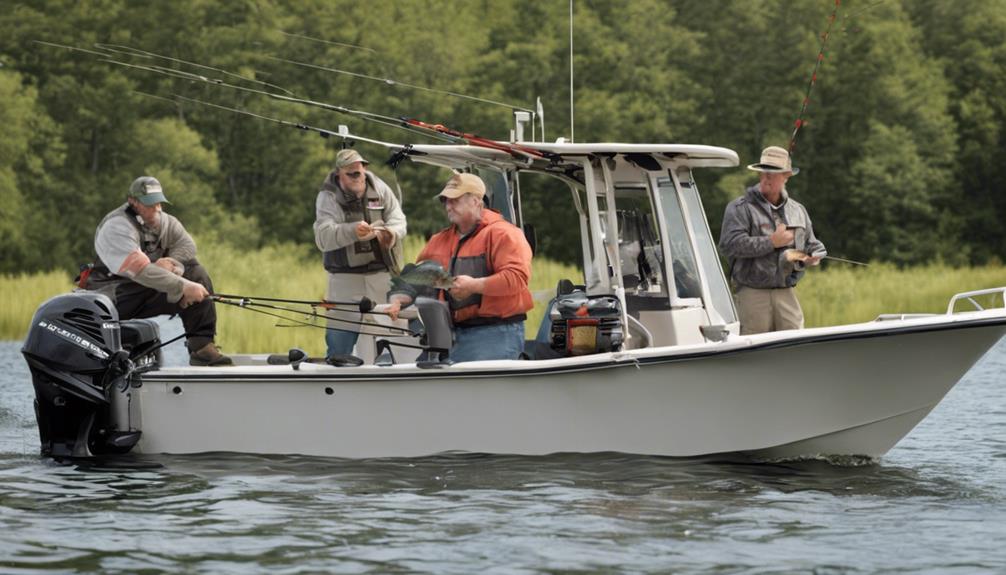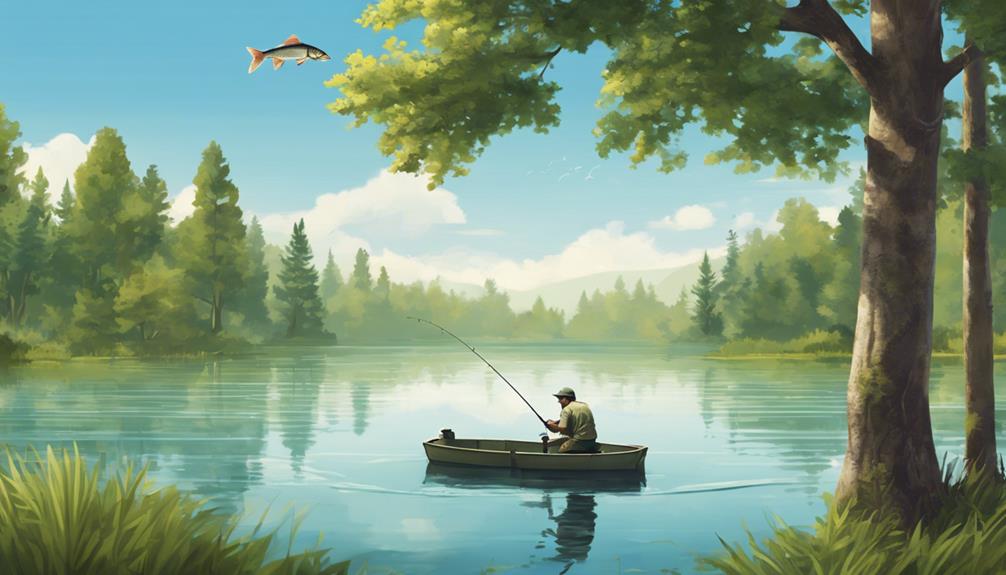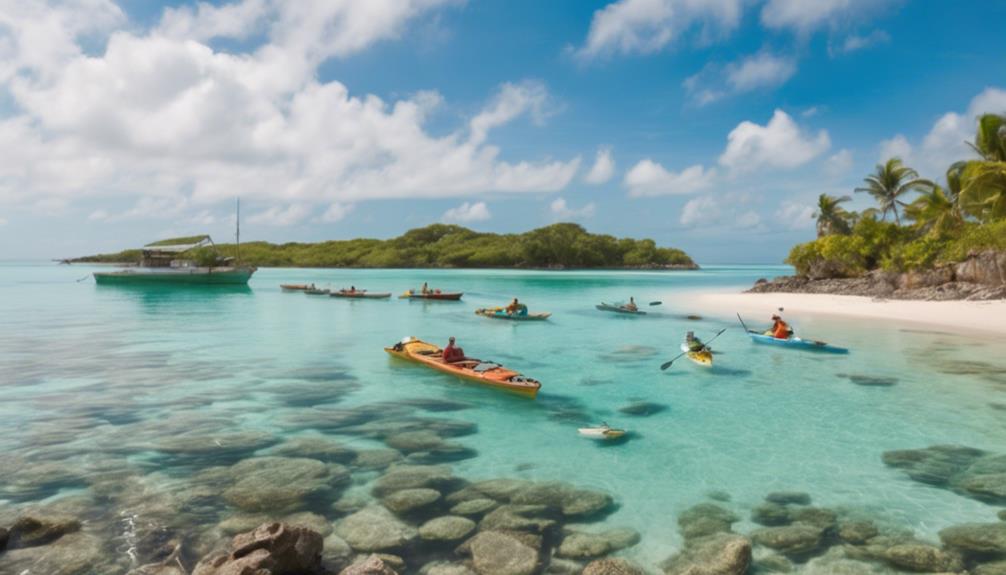Imagine a delicate tapestry being slowly unraveled by unseen hands, each thread representing a vital component of our marine ecosystems. Illegal fishing acts as the invisible force pulling at these threads, causing irreparable damage to the intricate web of life beneath the waves.
But fear not, for there are proven strategies and actionable steps you can take to combat this threat and safeguard our oceans for generations to come.
Understanding Illegal Fishing's Ecological Threat
Understanding the ecological threat posed by illegal fishing is crucial for implementing effective conservation measures. Illegal fishing activities have significant ecological consequences that can disrupt marine ecosystems and threaten the sustainability of marine resources. Conservation strategies play a vital role in combating these threats and protecting the delicate balance of marine environments.
Illegal fishing practices such as overfishing, bycatch, and habitat destruction can have devastating impacts on marine ecosystems. Overfishing disrupts the food chain, leading to declines in fish populations and affecting the overall health of marine species. Bycatch, the unintentional capture of non-target species, results in the unnecessary loss of marine life and further strains already vulnerable populations. Additionally, destructive fishing methods such as bottom trawling can damage essential habitats like coral reefs, seagrass beds, and mangrove forests, impacting the biodiversity and productivity of these ecosystems.
To address the ecological consequences of illegal fishing, various conservation strategies can be employed. Implementing and enforcing strict regulations and monitoring systems can help deter illegal fishing activities and promote sustainable practices. Collaborating with local communities, governments, and international organizations is essential for developing comprehensive conservation plans that safeguard marine ecosystems. Educating stakeholders about the importance of conservation and supporting alternative livelihoods can also help reduce the reliance on illegal fishing activities.
Impacts on Marine Biodiversity
Illegal fishing's ecological impact extends to marine biodiversity, with dire consequences for the delicate balance of underwater ecosystems. The illegal extraction of marine species disrupts the natural food chain and habitat integrity, leading to a decline in biodiversity within affected areas. Marine protected areas, which are designated regions safeguarding marine life from human interference, play a crucial role in conservation strategies. However, illegal fishing activities often encroach upon these sanctuaries, putting vulnerable species at even greater risk.
The depletion of key species through illegal fishing can have cascading effects on ecological resilience and species recovery. Certain marine organisms play essential roles in maintaining the health of their ecosystems, and their decline can trigger imbalances that reverberate throughout the food web. This disruption not only jeopardizes the survival of individual species but can also compromise the overall stability of marine environments.
To mitigate the impacts on marine biodiversity, it's imperative to strengthen enforcement efforts within marine protected areas and enhance monitoring mechanisms to detect and deter illegal fishing activities. Additionally, promoting sustainable fishing practices and supporting community engagement in conservation initiatives can help foster a more harmonious relationship between human activities and marine ecosystems. By prioritizing the protection of marine biodiversity, we can work towards restoring and preserving the intricate web of life beneath the waves.
Disruption of Ecosystem Balance
The unregulated exploitation of marine resources can upset the delicate balance of ecosystems, leading to significant disruptions in their functioning. Ecosystems are complex systems where each species plays a crucial role in maintaining the overall balance. When illegal fishing practices disrupt this balance, it can have far-reaching consequences on the entire ecosystem's health and stability.
Ecosystem fragility is a key concern when it comes to illegal fishing. These delicate systems rely on the interactions between different species to thrive. Illegal activities such as overfishing can deplete key species, leading to cascading effects throughout the ecosystem. To address this issue, restoration efforts are crucial. By implementing sustainable fishing practices and marine protected areas, we can help restore the balance within these ecosystems.
Conservation strategies play a vital role in mitigating the disruption caused by illegal fishing. Habitat protection is essential to safeguard critical areas where marine species breed, feed, and seek shelter. By establishing marine reserves and enforcing regulations to prevent illegal activities, we can better protect these habitats and the species that depend on them.
Effects on Endangered Species
Endangered species face heightened risks due to the detrimental effects of illegal fishing practices on their populations. The population decline of these species is a direct result of activities like overfishing, bycatch, and the destruction of crucial habitats. Conservation efforts are crucial in combating these threats and safeguarding the survival of endangered marine life.
Habitat destruction is a significant issue caused by illegal fishing practices. For endangered species such as sea turtles, coral reefs serve as essential nesting grounds and feeding areas. When these habitats are damaged or destroyed by methods like bottom trawling or the use of explosives, the survival of these species is severely compromised. Conservation strategies focusing on habitat restoration and protection are vital in mitigating these impacts.
Conservation efforts play a pivotal role in addressing the challenges faced by endangered species due to illegal fishing. Implementing stricter regulations, increasing surveillance and enforcement, and promoting sustainable fishing practices are key components of these conservation strategies. By actively engaging in conservation initiatives, individuals, organizations, and governments can work together to protect endangered species from the detrimental effects of illegal fishing practices and ensure their populations have a fighting chance at recovery.
Damage to Coral Reefs
Damage to coral reefs can have devastating consequences on marine ecosystems, impacting biodiversity and the overall health of underwater habitats. Coral bleaching, often caused by factors like pollution and rising sea temperatures, poses a significant threat to the survival of coral reefs worldwide.
Here are some key points to consider regarding the damage to coral reefs and its implications for marine conservation:
- Loss of Biodiversity: Coral reefs support a wide array of marine life, and damage to these reefs can lead to a loss of habitat for countless species, including fish, mollusks, and other invertebrates. This loss of biodiversity can have cascading effects on the entire ecosystem.
- Economic Impact: Coral reefs contribute significantly to tourism and fisheries industries. Damage to these reefs not only affects marine life but also the livelihoods of communities that depend on these industries for income.
- Vulnerability to Climate Change: Coral reefs are particularly vulnerable to the effects of climate change, such as ocean acidification and warming waters. Protecting coral reefs is crucial in the broader context of mitigating the impacts of climate change on marine ecosystems.
- Importance of Conservation Efforts: It's vital to prioritize marine conservation efforts to protect and restore damaged coral reefs. Implementing sustainable fishing practices and reducing pollution are essential steps in preserving these valuable ecosystems for future generations.
Altered Food Chain Dynamics
Considering the interconnectedness of marine ecosystems, altering food chain dynamics can disrupt the delicate balance of underwater life. Illegal fishing practices often target large predatory fish, impacting their populations and leading to cascading effects on trophic interactions within the ecosystem. When these top predators are overexploited, it can trigger a chain reaction that reverberates throughout the entire food web.
The reduced numbers of predatory fish due to illegal fishing can cause an imbalance in the ecosystem. With fewer predators to control their populations, smaller fish species may experience a population boom, leading to increased competition for resources. This surge in smaller fish populations can then result in heightened predation pressure on other marine organisms lower down the food chain.
Moreover, altering the natural predatory behavior of marine species can have far-reaching consequences. Predators play a crucial role in regulating the abundance of prey species, ensuring the health and stability of the ecosystem. Illegal fishing disrupts this balance, leading to potential declines in prey populations and affecting the overall biodiversity of the marine environment.
Loss of Habitats and Nursery Grounds
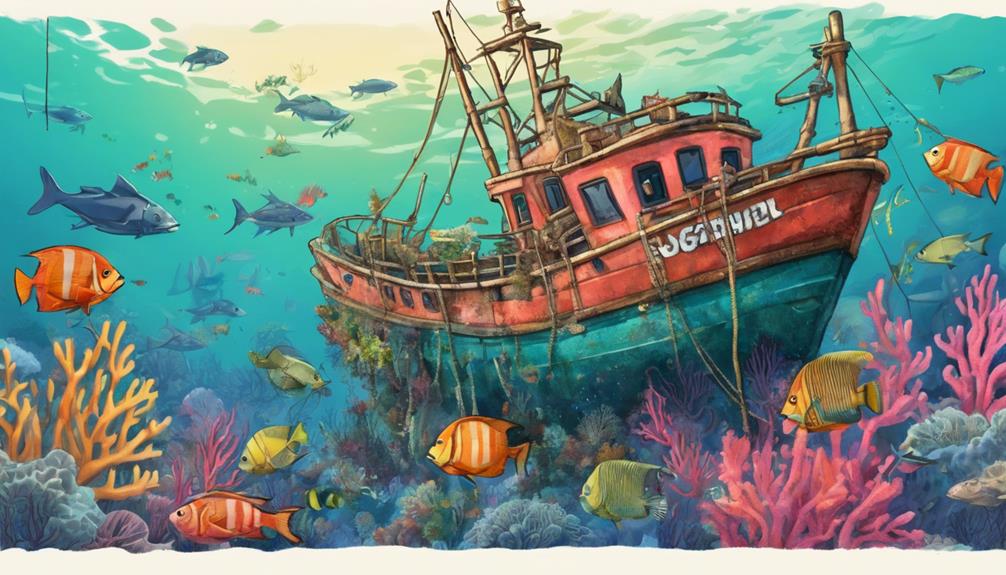
Illegal fishing activities can result in the loss of crucial habitats and nursery grounds for marine species, impacting the overall health of the ecosystem. Coastal erosion is accelerated when illegal fishing practices such as bottom trawling destroy important underwater habitats like coral reefs and seagrass meadows. These habitats serve as nurseries for many fish species, playing a vital role in their lifecycle and population sustainability.
Here are four key points to consider in mitigating the loss of habitats and nursery grounds:
- Coastal erosion: Illegal fishing practices contribute to the destruction of coastal habitats, exacerbating the natural process of coastal erosion. This can lead to destabilization of shorelines and further habitat loss for marine species.
- Conservation efforts: Implementing strict conservation measures and enforcing marine protected areas can help safeguard essential habitats from the detrimental effects of illegal fishing. By monitoring and patrolling these areas, authorities can reduce habitat destruction and promote ecosystem recovery.
- Seagrass restoration: Initiatives focused on seagrass restoration can help replenish critical nursery grounds that have been damaged by illegal fishing activities. Seagrass beds provide shelter and food for numerous marine species, supporting biodiversity and ecosystem resilience.
- Habitat protection: Establishing regulations to protect key habitats from destructive fishing practices is essential to preserve the delicate balance of marine ecosystems. By designating no-fishing zones and promoting sustainable fishing methods, habitats can recover and continue to support marine life effectively.
Overfishing and Depletion of Fish Stocks
Addressing the excessive harvesting of fish stocks is crucial for preserving marine biodiversity and ecosystem balance. Overfishing and depletion of fish stocks can have devastating effects on the ocean's delicate equilibrium. Without intervention, certain fish populations may collapse, disrupting the food chain and leading to cascading impacts on other marine species.
To combat this issue, implementing conservation measures is essential. Setting catch limits, establishing marine protected areas, and enforcing regulations to prevent overfishing are key steps in safeguarding fish stocks. By monitoring fishing activities and ensuring compliance with sustainable practices, we can work towards restoring balance to our oceans.
It is vital to promote sustainable fishing practices to prevent the overexploitation of fish populations. Adopting methods such as selective fishing gear, promoting responsible fishing practices, and supporting sustainable aquaculture can help alleviate the pressure on wild fish stocks. Additionally, consumer awareness and choosing sustainably sourced seafood can drive demand for ethical fishing practices.
Frequently Asked Questions
What Measures Can Individuals Take to Report and Prevent Illegal Fishing Activities in Their Local Waters?
To report and prevent illegal fishing in your local waters, get involved in community engagement. Support grassroots activism by staying informed, documenting suspicious activities, and reporting them to the appropriate authorities.
Encourage others to do the same and raise awareness about the impact of illegal fishing on marine ecosystems. By working together and taking action, individuals can play a crucial role in combating illegal fishing practices in their communities.
How Do Government Policies and Regulations Differ in Addressing Illegal Fishing in Different Regions of the World?
When it comes to government policies and regulations on illegal fishing around the world, the approaches vary significantly. These differences have global implications and affect the overall effectiveness of combating this issue.
Understanding the unique challenges each region faces is crucial in developing strategies that can effectively address illegal fishing activities and their ecological impact. By tailoring policies to specific contexts, authorities can better protect marine resources and biodiversity.
Are There Any Innovative Technologies Being Used to Track and Combat Illegal Fishing Practices?
Satellite tracking and AI monitoring are innovative technologies used to combat illegal fishing. Blockchain traceability and drones surveillance also play key roles.
These tools help authorities monitor vast ocean areas more effectively, track fishing vessels in real-time, and identify suspicious activities.
What Role Do Consumer Choices and Seafood Certifications Play in Reducing the Demand for Illegally Caught Fish?
Consumer awareness plays a crucial role in reducing the demand for illegally caught fish. By choosing seafood from sustainable sources and looking for certification programs like MSC or ASC, you can influence the market towards more responsible fishing practices.
Your choices as a consumer directly impact the seafood industry, encouraging fisheries to prioritize sustainability and ethical fishing methods. Make informed decisions to support the conservation of marine ecosystems and combat illegal fishing.
How Do Climate Change and Other Environmental Factors Exacerbate the Ecological Impacts of Illegal Fishing?
Climate change impacts worsen the ecological consequences of illegal fishing by disrupting marine ecosystems and altering fish migration patterns. These environmental changes can lead to overfishing, habitat loss, and species extinction.
Illegal fishing exacerbates environmental degradation caused by climate change, creating a harmful cycle that threatens marine biodiversity.
It's crucial to address both illegal fishing practices and climate change to protect our oceans and their delicate balance.
Conclusion
So, remember to be vigilant and report any suspicious fishing activities to authorities.
By taking action and supporting sustainable fishing practices, you can help protect marine ecosystems and biodiversity.
Together, we can mitigate the destructive impact of illegal fishing and ensure a healthier future for our oceans.
Don't underestimate the power of your actions in preserving our precious marine environments.
Take a stand against illegal fishing today!
